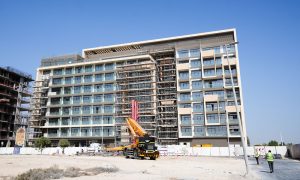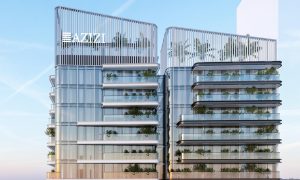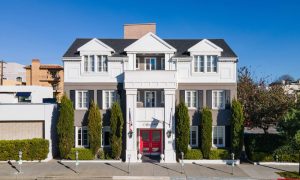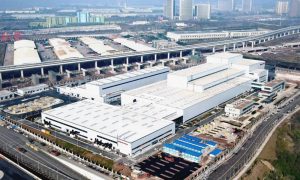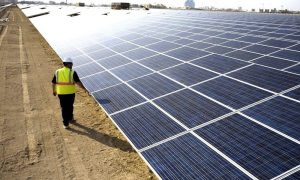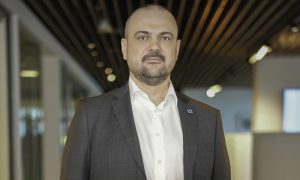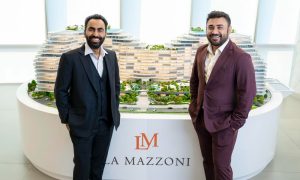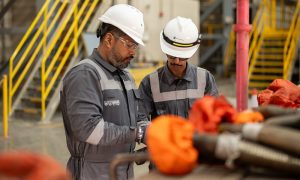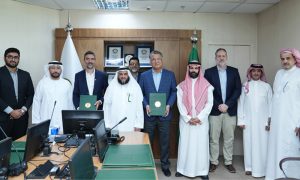Sustainable growth
ECC’s Kareem Farah talks to BPME’s Jason Saundalkar about the ECC Group’s success in 2023, market trends and decarbonising construction globally with Desert Board

Dubai-headquartered Engineering Contracting Company (ECC) has constantly broken new ground in the built environment, from being one of the first companies in the UAE to adopt Building Information Modelling (BIM) across its operations and projects, to rolling out a Common Data Environment, and being the first contractor in the country to earn the BIM Kitemark Certification from BSI, and receiving the BIM ISO certification from the same body.
The ECC Group, which comprises Abanos, ECC Fit Out and Construction, Desert Board, Aurora Real Estate Development, United Masters Electromechanical, and others, saw a great deal of success in 2023. Kareem Farah, CEO of ECC tells Big Project Middle East that the group as a whole picked up more projects last year than it has in the past seven years, in line with the growth of the real estate segment in the UAE, and its key markets.
“We definitely see the market advancing; the construction division has picked up a lot of work, along with ABANOS and Prime Metal Industries (PMI). We’re pushing them to now take on more work outside of ECC, so we can open up work to our supply chain. We like to balance things out with the supply chain, so we’re not just giving everything to our sister companies. Then you have United Masters Electromechanical, our MEP company, they’ve also taken a lot of work on from outside of ECC, mainly from other construction companies. Of course, we’re being very careful about who we work with, because as much as the market is booming, you still have to be very selective over which contractors, clients and consultants you work with. We can definitely grow faster but our reputation is everything to us, so strategically, we’re growing at a tempered more organic pace,” says Farah.
Farah points out that the UAE has been the key driver for the group’s growth in 2023 and notes that he’s keen to keep focused on the country, and maintain ECC’s reputation by continuing to deliver quality work.
“We’re quite happy with what’s going on in the UAE. Reputation is everything to us, typically the more you grow, the more difficult it is to control quality. We are in the process of setting up systems, so that we’ve got a centralised office that monitors all of our sites. With technology such as modern dashboards and data harvesting, we can monitor things more closely and maintain our quality and reputation. As we evolve, it will become a lot easier to monitor projects and quality, so in the future we’ll look at overseas markets but we’re happy in the UAE, and like the direction that the country is moving in,” he remarks.
Discussing the market and trends that emerged in 2023, Farah is quick to point out the growth in the luxury residential segment with regards to villas, particularly in Dubai. “There’s a big shortage of luxury villas, and developers are trying to attend to that shortage. We’ve also won a lot of residential towers, so residential is still the driving force for the market. People are now more switched on with regards to the quality of the final product, so developers are becoming more stringent, and strict on their snagging processes, so that the product they are handing over is of high quality.”

The firm has completed 16 buildings in Phase 1 & 2 of Dubai Creek Harbour, and is engaged with Phase 3 on 14 structures, along with Phase 4 and 5 for 16 buildings on a design & build basis.
“Smart buildings are also becoming more prominent. Developers are putting technology in their buildings and homes, and with the latter, are connecting homes to users’ smartphones. With regards to sustainability, the push for sustainable development and decarbonisation is not where I’d like to see it – it can definitely be stronger. With the conclusion of COP28, I think that will happen. As they’ve always done in the past, the leaders of the UAE are eager to put the country on the map, and they are keen to show that although the UAE is an oil generating country, it is serious about sustainability. Hosting COP28 showed the country was serious, and I think more focus on sustainability will come on stream this year, and it will be driven by government rather than developers and end users. I think they’re trying to make it much more attractive for developers to build sustainable buildings, and schemes could be put in place with banks where lower interest rates are offered, if it’s for a sustainable project.”
Asked whether these trends will continue through 2024 or if he anticipates changes, Farah responds, “There’s more projects coming online and there’s still appetite in the market in terms of residential projects. I see the luxury segment growing, but I do feel that the affordable segment of real estate has slowed down a bit. With the demographics that we have in the country and the amount of new money that’s come into the market from wealthy families, who have decided to make the country their base has been incredible. I think it’s going to continue, which will keep driving luxury developments, particularly when it comes to villas.”
Continued Investments into Technology
ECC and its sister concerns have made a name for themselves by being early adopters of technology. Going forward, Farah says the group will continue investing in technology and people to boost efficiency and quality.
“We’ve been investing in technology for years and now have our own in-house coding team so that we can create our own systems and processes. One of the big issues with technology is the sheer amount of it – it can be overwhelming and more so when it comes to customisation. We’ve appointed in-house coders to create what we need, and we are trying to digitalise as much as possible, do away with paper and automate wherever it is possible. We brought in RPAS (robotic process analysis) and they do the legwork on a lot of processes, so instead of a person entering information into a system manually, the bot will do it, and it’ll do it eight times faster. It’s important to keep an eye on all the new technology that’s coming out, and adopt what will give you an edge. We use technology to make sure standards are maintained, and you can do the same thing with safety.”
“BIM is ever advancing and we’re continuously driving forward with it, although there are still issues around the technology – if you don’t have your entire supply chain on BIM, it becomes a little irrelevant, so we’re trying to drive down that route. As one of the few design and build (D&B) companies (there’s maybe three or four that can do it right), we’ve noticed that we’ve won a lot more projects on a D&B basis. Our track record proves that we can finish projects on time or ahead of schedule thanks to going down the D&B route, where we are on-board with a consultant and we have control.”
Pressed for his thoughts on artificial intelligence (AI) and whether ECC is deploying it, Farah comments, “We’re at the early stages of AI in construction and all the other sectors but, it’s moving at a fantastic pace; give it a year or two and it’ll be a completely different ballgame. At ECC we are looking for an AI engineer, and we’ll either bring in a consultant to help us with that or we’ll hire our own person, who will look at our systems and processes, and look at how we can automate things and bring in AI to boost efficiency and quality. AI is primed to be a game changer in all industries, not just construction.”

La Reserve Residences’ features 230 units, including 1, 2, 3, and 4 bedroom residential units.
Leading Decarbonisation Efforts with Desert Board
ECC has been focused on enhancing sustainability and decarbonisation within its internal operations and projects, with Farah stating that the company has looked at multiple avenues over the years.
“We’re looking at every option that’s available. I had a conversation with a company about deploying battery storage systems onsite that help take load off the onsite generators. We’re also looking at renewable sources for jobsites, including solar powered generators which are now at a different level of advancement compared to when we first looked at them back in 2012. Back then, those generators were fine for powering site offices but when it came to heavy machinery, like tower cranes, when the cranes came under load from lifting materials etc, it caused problems for those generators. That’s been resolved now so we’re looking into them again.”
“Solar power is also being looked at for all our offices and factories. With regards to our fleet, we considered electric vehicles but I don’t think the infrastructure is there just yet – there’s not enough infrastructure that it’s straightforward to charge a lot of vehicles. The infrastructure has to get better before we can consider electric for a fleet like ours, so we’re instead looking at hybrid vehicles.”
Here, Farah, notes that the group’s biggest push for sustainability is through the introduction and launch of Desert Board. The company aims to pioneer a carbon negative future in the built environment through the world’s first wooden boards made from annually generated palm biomass.
“Post COP28, I reckon that the environmental governance and processes that you have in western countries around carbon credentials will be adopted by the UAE in the next one or two years, in line with its vision to be more sustainable and achieve Net Zero. So, then if a company adds carbon into the atmosphere, it has to go to another company which is a ‘carbon net’ or a ‘carbon sink’, to buy carbon credits and offset the carbon it is emitting. Even though this hasn’t been adopted or mandated by the government, we’re looking to bring in a consultant to work with us on this.”
“With Desert Board being part of the group we have an advantage. We actually had an international body come in and do an LCA (Life Cycle Assessment) analysis on Desert Board; the results showed it’s actually a carbon sink because of the amount of Carbon Captured through Photosynthesis by the Date Palm Tree. Typically all the boards that have been used traditionally in the UAE are imported – nothing is made locally. We are the first company to locally make wood from residual palm biomass. The palm tree is significant to the UAE and the broader region, and with Desert Board, we’ve found a way to fully utilise this iconic tree at an industrial scale in the pursuit of sustainability.”

He adds, “In fact, due to the carbon credentials associated with our Palm Stand Boards (PSB), Desert Board is able to give construction stakeholders that previously used particle boards (PB) a sustainable option that will enable their projects to accumulate LEED points.”
Farah notes that the PSBs have a number of potential applications and have already been used to great effect. “For COP28, we built a lot of stands using Desert Board’s PSBs. We have furniture in the office made from the material but it can also be used for fire rated doors, flooring, cabinetry, and even construction within ECC, the shuttering boards that we use are PSBs from Desert Board rather importing boards from other countries. Our PSBs can actually be used up to 40 times; this is in contrast to traditional shuttering boards which can only be used 10 to 15 times and then have to be disposed of.”
Desert Board’s PSB range is comparable in cost to what is currently being imported and used in the construction space. The firm’s PSBs can also be recycled after they’ve been used, creating a circular economy, Farah explains.
Asked about the strategy to roll out Desert Board to the market, Farah notes that it’s being driven from the top down. “We’re directly engaging with authorities and decisionmakers and the great news is there is eagerness to promote local product that comes from an icon of the country. We’ve been told that our PSBs are equivalent to oriented strand boards (OSB) that are used in Europe and the United States. OSBs are usually made from pinewood, rubberwood or bamboo and other types of wood sourced from trees. To make those OSBs you have to cut down trees, which means if there are restrictions on cutting down those trees, there will be a deficit in supply.”
“With Desert Board, our PSBs are made from annually generated palm biomass – we prune the dead fronds as necessary to preserve the overall health of the tree. Those fronds, surprisingly enough take decades to degrade. Palm fronds can actually sit in landfills for 10s or even 100s of years, though they are sometimes either buried or burned. The latter results in the creation of CO2 but instead, through Desert Board, we take those fronds and create our PSBs.”
He continues, “We’re working with Emaar and we’re using the boards for doors, internal doors and even fire rated doors; we have certifications where we can create 60 minute and 90 minute fire rated doors with our PSB. The boards are also being used for cabinets and kitchens by developers including Emaar, Select Group and Aldar. As they are all prominent and well respected companies in the industry, we are confident more developers will learn about the great and unique qualities of PSB helping to drive sustainability within their development strategy. Our fantastic marketing team is highlighting the PSB range across the global market; given its potential to drive significant decarbonisation in the built environment, we are starting to see incredible traction across the GCC and broader Middle East, Africa, Europe, the United States, and Canada. We have ambitious plans for Desert Board and we are confident that we will capture a global audience.”

Discussing sustainable alternatives to existing materials that are used in construction, Farah says Desert Board has multiple roles to play going forward. “The biggest emitters of carbon in the built environment are cement, concrete and steel, and those will continue to be used on projects to varying degrees going forward. However, our Desert Board PSB range could be an alternative in many cases; for example, we’ve built a two storey house purely from our PSB which showcases that the boards are strong enough to withstand structural load – there’s no concrete or steel other than in the foundation. This is just a prototype home and we are working with authorities to get the product certified for this sort of use. In the west, a lot of homes are built from wood, so it’s a case of educating the market about moving away from the mentality of exclusively using concrete and steel. We’re hopeful of achieving this via consistent education and by showcasing our proof of concept.”
Farah says that in 2024, Desert Board will be a key focus for him and ECC’s management, and they have plans to scale up its production, with a view to seeing it used across the globe.
“Desert Board has the potential to become the flagship business within our group. The inspiration behind this venture stems from a genuine and altruistic idea, representing a legacy project that has been 20 years in the making for our chairman, Mr. Hatem Farah. It embodies his desire to contribute to the nation where he made his home, and through the support and opportunities the UAE has provided, he was able to build a successful group of companies. Our chairman holds deep admiration and respect for the country’s rulers while recognising the significance of palm trees, which were especially important to the Founding Father, His Highness Sheikh Zayed. Desert Board serves as his expression of passion, to solve challenges in the construction industry associated with climate change, and gratitude. A way of reciprocating the nation’s substantial contribution to his success.”
